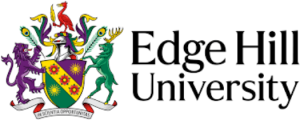The Arts for the Blues toolkit includes information for organisations, managers, and practitioners.
It includes our recommendations for:
- Scaling up creative arts projects for health and wellbeing
- Implementation steps for embedding Arts for the Blues in your organisation
- Information about the training and support we offer.
The Arts for the Blues team work with local providers of mental health interventions to support the delivery of the Arts for the Blues. We train practitioners to work with the key ingredients and to deliver the model in groups. We support organisations to develop the model within their service and to measure the impact of their work with Arts for the Blues.
Scaling up
Arts for the Blues
Arts for the Blues is a versatile model that can be embedded in many diverse settings. Our report ‘Scaling up place-based arts initiatives that supports mental health and wellbeing’ makes several recommendations for embedding and scaling up arts initiatives, including Arts for the Blues.
Our report recognises the challenges and opportunities for scaling up within organisations. Our recommendations at project level are for initiatives to be acceptable (ACCEPT). At organisational level we recommend initiatives are nourished (NoURISH) and at policy level they should be targeted (tARGETS).

ACCEPT
Initiatives at project level should be acceptable: Adaptable, Clear, Collaborative, Evidence-based, Personalised, Transformative.

NoURISH
Initiatives at organisational level are nourished: Need, Understanding, Resources, Inspiration, Skillset, Help.

tARGETS
Initiatives at policy level should be targeted: Attitude shifts, Rules & guidelines, Gaps in provision, Early intervention, Treatment options, Service changes.
Recommendations at a
project level
ACCEPT
For a place-based arts initiative that supports mental health and wellbeing to become scalable, it needs to be:
Adaptable to address diverse mental health concerns and wellbeing needs.
Clear so it is easily understood.
Collaborative to support trusting relationships.
Evidence-based to convince different audiences.
Personalised to meet the specific needs of individuals and communities.
Transformative to energise and support change
Adaptable, Clear, Collaborative, Evidence-based, Personalised, Transformative = ACCEPT
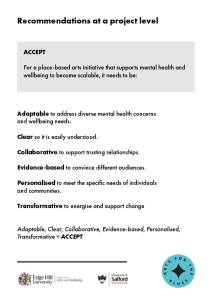
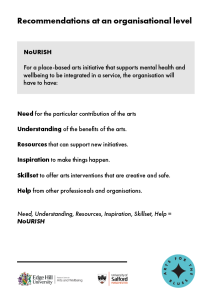
Recommendations at an
organisational level
NoURISH
For a place-based arts initiative that supports mental health and wellbeing to be integrated in a service, the organisation will have to have:
Need for the particular contribution of the arts
Understanding of the benefits of the arts.
Resources that can support new initiatives.
Inspiration to make things happen.
Skillset to offer arts interventions that are creative and safe.
Help from other professionals and organisations.
Need, Understanding, Resources, Inspiration, Skillset, Help = NoURISH
Recommendations at a
policy level
tARGETS
For a place-based arts initiative that supports mental health and wellbeing to become scalable, it needs to consider:
Attitude shifts on how the arts are perceived.
Rules and guidelines that govern services.
Gaps in provision that need to be filled.
Early intervention options such as social prescribing.
Treatment options for those who are more vulnerable.
Service changes and opportunities that come from these changes.
Attitude shifts, Rules and guidelines, Gaps in provision, Early intervention, Treatment options, Service changes = tARGETS
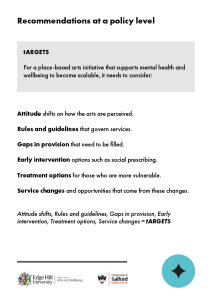
Setting up Arts for the Blues in your organisation
- Contact for a meeting: Get in touch with the Arts for the Blues team to register your interest and find out more about what the project can offer your organisation.
- Complete needs assessment: Complete a needs assessment with the Arts for the Blues team to discuss your organisational needs.
- Discuss training needs: Once a needs assessment has been completed we will explore the training needs for staff within your organisation.
- Explore ethics: Depending on how your organisation would like to measure impact we can support an application to a research ethics committee if appropriate.
- Agree evaluation methods: We can work with any existing evaluation methods your organisation uses and make recommendations based on current evidence.
- Set up recruitment: Now you can begin to think about promoting the Arts for the Blues to the people you work with and how best to meet their needs in setting up the groups.
- Deliver intervention: Once you have Arts for the Blues trained staff, evaluation set up and participants willing to join, now is the time to deliver the Arts for the Blues group.
- Report findings for Arts for the Blues team: Once you have begun delivering the group, you will now be able to report findings from your evaluations to the Arts for the Blues team in order to feed into a community of practice, help us evaluate best practice and support the growth of the evidence base.
Training
We offer training that is designed to introduce practitioners to the model and to support them to establish the Arts for the Blues into their existing practice. Arts for the Blues is a group intervention and the training helps practitioners to develop their skills working with groups.
What will the training consist of?
The Arts for the Blues training workshops take place over two days and incorporate theory with experiential work in the form of group creative activities.
Day 1
Focuses on the overall model, theoretical underpinnings and the key ingredients of the Arts for the Blues model.
Day 2
Explores theoretical and experiential principles associated with facilitating groupwork through the Arts for the Blues model.
Who is it for?
We work with a wide variety of practitioners which is supported by our recent findings that creative arts projects work best when services collaborate across disciplines. Examples of practitioners already trained as Arts for the Blues practitioners are: mental health practitioners, artists, arts and health practitioners, community practitioners, counsellors and psychotherapists, counselling psychologists, arts therapists and other licenced therapists.
What are the expectations after the training?
Mental health practitioners will enhance their current practice and the full Arts for the Blues model is delivered initiated either by:
Practitioners who will seek permission to run Arts for the Blues groups in their service
Managers who will authorise Arts for the Blues groups to be offered as part of routine delivery in their service.
If the full Arts for the Blues model is delivered we can offer:
- Supervision and reflective practice [with additional cost].
- Support with evaluating the group that will be shared with the Arts for the Blues team.
Findings
An evaluation of the Arts for the Blues training established three key findings. Arts for the Blues training:
- Helps develop understanding of the model, using group work, and how it can be embedded into current work
- Encourages capacity building within organisations and increased confidence to embed the model into services
- Allows for collaboration across disciplines by working with the wide range of practitioners that work with people struggling with mental health & wellbeing.
Information for practitioners
Our Arts for the Blues practitioner website has examples of Arts for the Blues practice for Arts for the Blues trained practitioners.
Squiggle Game
Tree of Life
Sandtray Exercise
Bespoke training services >
Contact us to find out more about our training opportunities.
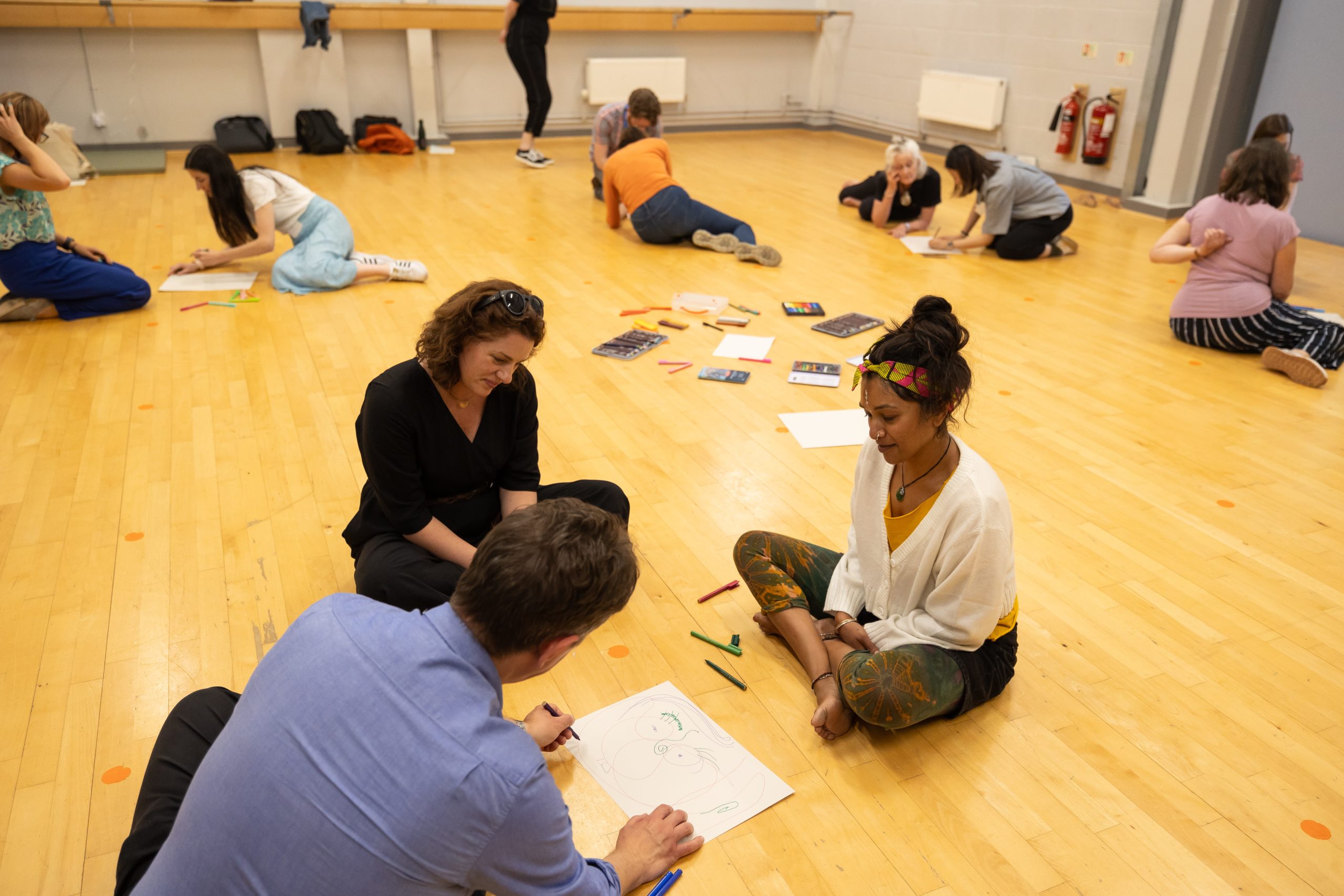
“I think anything that increases choice and accessibility is a really good thing”
(NHS Manager)
Get in touch >
If you are interested in Arts for the Blues for your organisation, get in touch to find out how we can partner with you.
